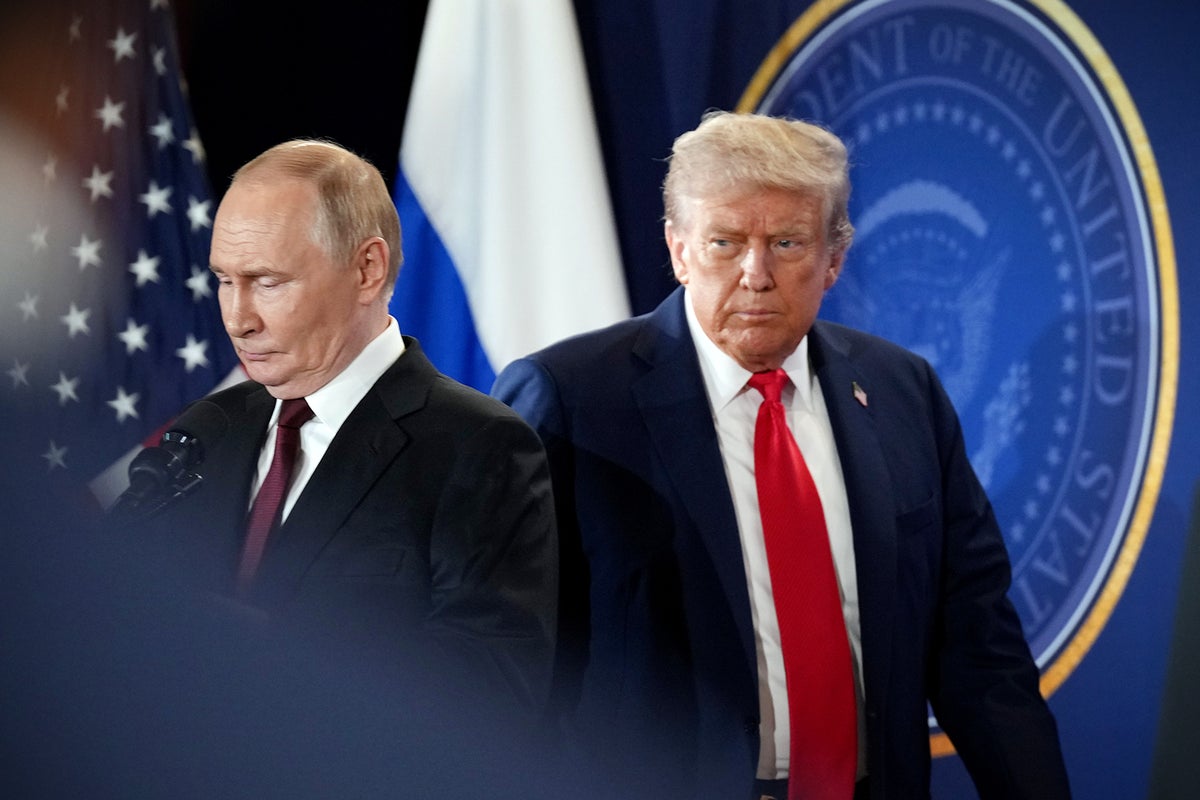Russian drones and missiles blasted sites across Ukraine on Wednesday, killing at least six people, but the Kremlin sought to revive hopes of another summit with Donald Trump after Washington appeared to put the plans on hold.
The attack came in waves and targeted at least eight Ukrainian cities, as well as a village in the region of the capital, Kyiv, where a strike set fire to a house in which the mother and her 6-month and 12-year-old daughters were staying, regional head Mykola Kalashnyk said
Russian drones also hit a kindergarten in Kharkiv. One person was killed and six were hurt, but no children were harmed.
Donald Trump said on Tuesday he did not want a “wasted meeting” after a White House official said that there were “no plans” for a bilateral summit “in the immediate future”.
He had indicated last week that he and Putin would hold talks in Budapest within two weeks, but Moscow’s reluctance to agree to a ceasefire appears to have derailed diplomatic efforts.
Kremlin spokesperson Dmitry Peskov suggested on Wednesday that a meeting could still go ahead. Asked whether there was a pause in plans, he told reporters that the dates merely “have not been determined” and that more preparations were still needed.
He said that the summit was “surrounded by a lot of gossip, rumours, and so on”, and that there was “no news yet”. Peskov assured that neither Trump nor Putin “wants to waste time”.
Hungarian prime minister Viktor Orban echoed Russia’s insistence that preparations for talks in Budapest would continue.
“The date is still uncertain,” he said. “When the time comes, we will hold it.”
A White House official told The Independent on Tuesday that there are no plans for a presidential summit in the “immediate future”.
They said that Secretary of State Marco Rubio had conducted a “productive call” with his Russian counterpart, Foreign Minister Sergey Lavrov, which made an in-person meeting between the two top diplomats “not necessary.”
Trump later told reporters that he did not want to have “a wasted meeting”, but did not rule out a meeting in the future.
The US leader refused to go into details of why the talks had broken down, but the US-backed idea of a ceasefire along the current frontlines appears to have become a sticking point.
Russian foreign minister Sergei Lavrov made clear in comments on Tuesday that Russia is opposed to an immediate ceasefire, and repeated the need to address the “root causes of the conflict”, indicating maximalist designs on Ukraine.
While Kyiv is opposed to withdrawing entirely from the Donbas, fearing Russia could use the territory to launch a future attack, it has indicated an openness to freezing battle lines and starting peace talks.
Ukrainian president Volodymyr Zelensky said on Wednesday that Trump’s suggestion to stop the fighting on current lines was a “good compromise”. He also said Russia’s attempts at diplomacy “mean nothing” after strikes on Kyiv overnight, and said access to “long-range capabilities” would help “bring the end of the war closer”.
The idea of a second summit, after the meeting between Putin and Trump in Alaska failed to yield tangible results, was floated after a phone call between the Russian and American leaders last Thursday.
The White House hailed the call as “productive”, but Russia on Tuesday said its terms for peace were unchanged since Alaska.
Trump has said preparatory talks between senior US and Russian officials showed that the gap between the two countries was too large to begin negotiations over ending the conflict.
With Trump’s patience apparently slipping, Ukraine and its allies in Europe were rallying to prepare their own peace deal plan to keep Washington onside. National security advisers this week discussed details of the plan ahead of a summit in London on Friday.
EU officials said that it would be modelled on the ‘Board of Peace’ touted in Trump’s peace plan for the war in Gaza, with Trump chairing the committee.
Putin also directed drills with Russia’s strategic nuclear forces, involving practice missile launches, in northwestern Russia and the Barents Sea on Wednesday.
General Valery Gerasimov, Chief of the General Staff, said the drills were meant to simulate the “procedures for authorising the use of nuclear weapons”.
As Russia faced even more scrutiny over its commitment to peace talks, Putin insisted that the drills have been planned in advance.

